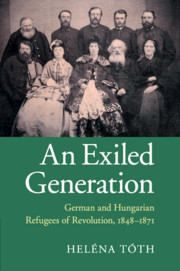
-
Select format
-
- Publisher:
- Cambridge University Press
- Publication date:
- 05 November 2014
- 30 October 2014
- ISBN:
- 9781107110335
- 9781107046634
- 9781107682290
- Dimensions:
- (228 x 152 mm)
- Weight & Pages:
- 0.61kg, 310 Pages
- Dimensions:
- (229 x 152 mm)
- Weight & Pages:
- 0.46kg, 310 Pages
You may already have access via personal or institutional login
Book description
Focusing on émigrés from Baden, Württemberg and Hungary in four host societies (Switzerland, the Ottoman Empire, England and the United States), Heléna Tóth considers exile in the aftermath of the revolutions of 1848–9 as a European phenomenon with global dimensions. While exile is often presented as an individual challenge, Tóth studies its collective aspects in the realms of the family and of professional and social networks. Exploring the interconnectedness of these areas, she argues that although we often like to sharply distinguish between labor migration and exile, these categories were anything but stable after the revolutions of 1848–9; migration belonged to the personal narrative of the revolution for a broad section of the population. Moreover, discussions about exile and amnesty played a central role in formulating the legacy of the revolutions not only for the émigrés but for their social environment and, ultimately, the governments of the restoration.
Reviews
'A transnational social history of exile that questions established categories of analysis and challenges our understanding of connections between Central Europe and the wider world.'
Axel Körner - University College London
'Shifting the focus from celebrated political exiles like Karl Marx and Lajos Kossuth, Heléna Tóth tells the story of the many other German and Hungarian émigrés who left their homes in the wake of the 1848 revolutions. Tóth’s innovative study ranges widely, effortlessly carrying us from the neighboring lands that first welcomed the émigrés (Switzerland and the Ottoman Empire) to the more distant shores where many exiles settled (the United Kingdom and the United States). Along the way she reveals the many obstacles the émigrés faced, as well as the family, professional, and social networks that sustained them. Well researched and cogently written, this study offers a definitive analysis of what exile meant in the mid-nineteenth century, both for the émigrés themselves and for how the 1848 revolutions would be remembered.'
Robert Nemes - Colgate University
'Exile was a common fate of the revolutionaries of 1848. Expanding her focus outward to pan-European and trans-Atlantic political networks and inward to family and community connections, Hélena Tóth explores political refugees’ migration patterns, career choices, and retrospective attitudes toward their one-time activism, showing how the exile experience contributed to the shaping of political culture in Europe during the second half of the nineteenth century.'
Jonathan Sperber - Curators’ Professor of History, University of Missouri
'The main strength of Tóth’s study derives from the stories she found in the dusty corners of archives, such as the anecdote about Johann Georg Holzschreiter, an innkeeper and postmaster from Baden, who settled in the border region in Switzerland but continued visiting his family back home for years until Prussian soldiers captured him, despite the support he got from the townspeople, or the story of Joseph Dietrich, likewise from Baden and similarly someone who regularly crossed the border.'
Ágnes Deák Source: Hungarian Historical Review
Contents
Metrics
Altmetric attention score
Full text views
Full text views help Loading metrics...
Loading metrics...
* Views captured on Cambridge Core between #date#. This data will be updated every 24 hours.
Usage data cannot currently be displayed.
Accessibility standard: Unknown
Why this information is here
This section outlines the accessibility features of this content - including support for screen readers, full keyboard navigation and high-contrast display options. This may not be relevant for you.
Accessibility Information
Accessibility compliance for the PDF of this book is currently unknown and may be updated in the future.


